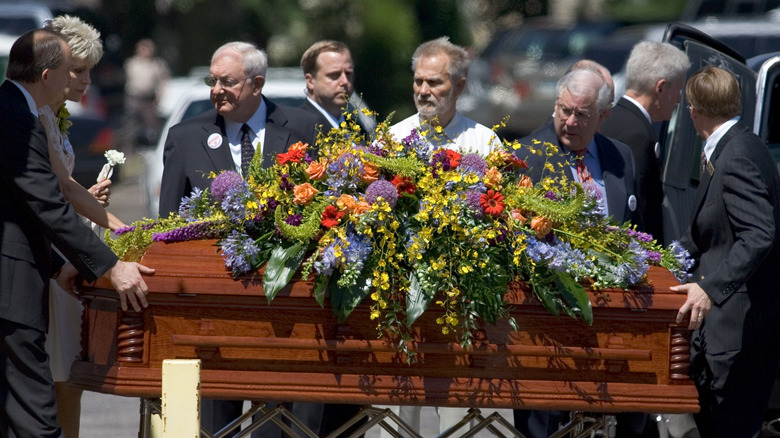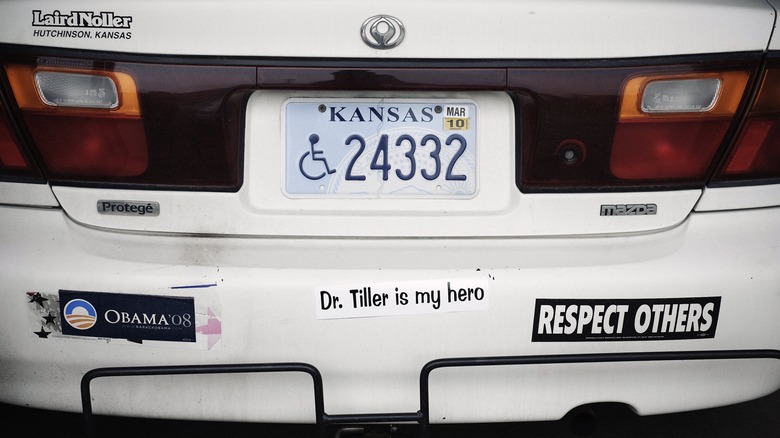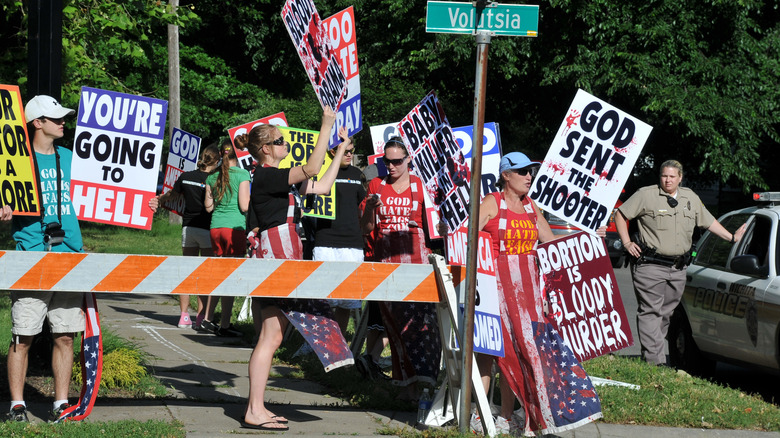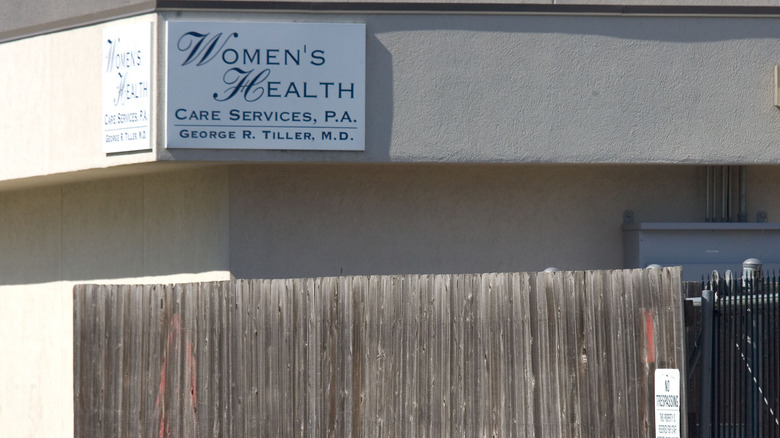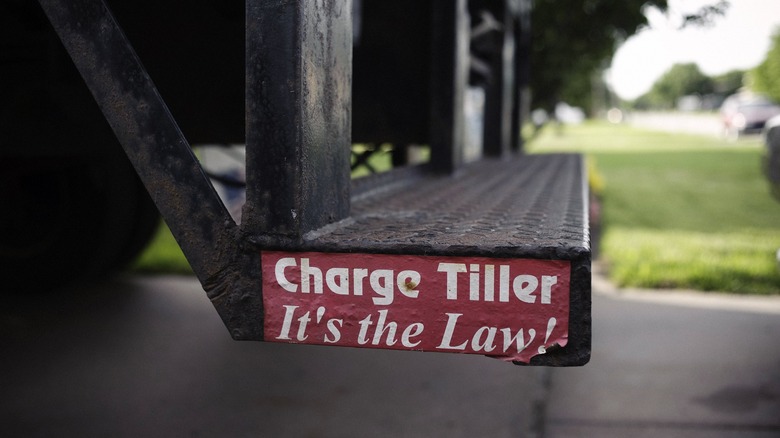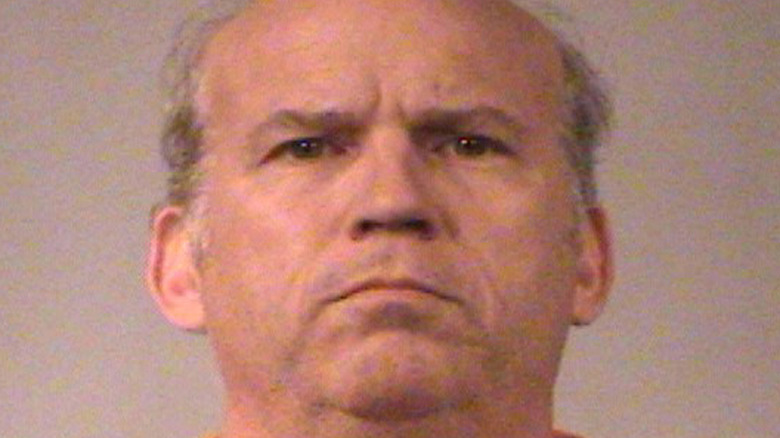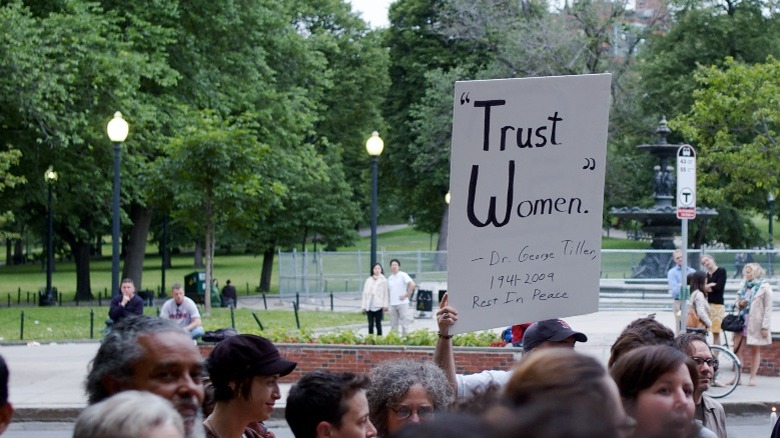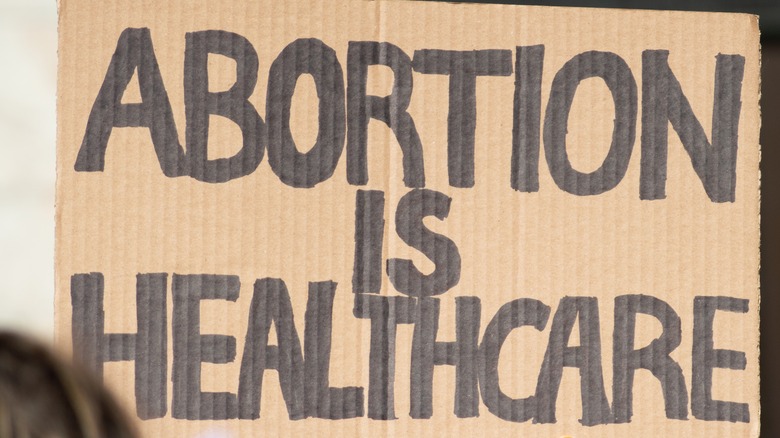Dr. George Tiller: The Tragic Life And Murder Of An Abortion Doctor
For over 35 years, Dr. George Tiller provided abortion services to people in Wichita, Kansas and the surrounding area. And despite being repeatedly demonized and attacked by anti-abortion extremist groups throughout his life, Tiller continued to fight for people to have access to safe abortions. In a eulogy for Tiller, Rabbi Arthur Waskow, who had gone to see Tiller when his wife Natalie needed an abortion, wrote that Tiller "had an understanding of [our] pain, perhaps better than anyone who has never gone through it personally."
Soon after Roe v. Wade was overturned in 2022, at least 13 states banned abortion entirely, and four others imposed bans after 6 to 20 weeks (although legal appeals and new legislation mean these numbers are continuously changing). And as a result of criminalizing safe abortions, many doctors have found that they have no way to care for patients with life-threatening pregnancy complications.
Tragically, Tiller was neither the first nor the last only abortion provider in American history to be assassinated. In 1993, Dr. David Gunn became the first abortion provider to be shot and killed in the United States when he was murdered by anti-abortion extremist and white supremacist Michael Frederick Griffin. And between 1990 and 2021, there were nine other murders of abortion providers and 26 attempted murders. This is the story of one of them, Dr. George Tiller.
The following article includes descriptions of violence and mentions of sexual assault.
The early life of George Tiller
Dr. George Richard Tiller was born in Wichita, Kansas on August 8, 1941. His father, Dr. Dean Jackson Tiller, was a well-known family doctor in Wichita during George Tiller's youth, but he also secretly performed abortions, which were still illegal at the time. According to "A Death in Wichita" by Stephen Singular, after he started performing abortions in the 1950s, Jack Tiller became known in underground networks as one of the few safe illegal abortion providers.
As a child, George Tiller only knew of his father as a family doctor. According to "American Dissidents," edited by Kathlyn Gay, he sometimes went on house calls with his father and it was during these visits that he was inspired to become a doctor himself.
After graduating from the University of Kansas in 1963, with a bachelor's degree in zoology, George Tiller went on to get his medical degree from the Kansas School of Medicine in 1967. But in "The Family Rose," Joshua Prager writes that George Tiller's on-track medical career was almost derailed when he got a woman pregnant in college. Tiller recalled later in his life "the terror and the anxiety associated with thinking that I was going to be a dad." George Tiller never revealed if the woman had a miscarriage or an abortion, but his fatherhood was ultimately delayed. And when he later became an abortion doctor, he empathized with the fear his patients felt, as it was once his own.
A family accident
In addition to being a family doctor, Dr. George Tiller's father was also a trained pilot and regularly flew their family to different places. But in 1970 during a flight to British Columbia, the plane that he was flying crashed into a hill in Yellowstone National Park, killing everyone on board. Both of Tiller's parents, Catherine Tiller and Dean Jackson Tiller, as well as his sister Paula and her husband, died in the crash.
According to "A Death in Wichita" by Stephen Singular, during this time. George Tiller was working as a surgeon at the Naval Aerospace Medical Institute, after which he planned to start a residency in dermatology. Upon hearing of the family tragedy, he was given a humanitarian discharge and he moved back to Wichita to deal with family affairs. He and his wife, Jeanne, also ended up adopting his sister's orphaned son.
Although George had intended to return to his dermatology career, his father's patients insisted that he stay because they had no one else. As he took up his father's practice as a family doctor, George Tiller also started learning about how his father also performed abortions, and soon people were coming to him seeking the same treatment, The New York Times reports. And although George was initially reluctant to perform abortions himself, he changed his mind after talking with his patients and learning about a woman who'd died because his father had refused to give her an abortion.
Harassment by anti-abortion groups
For a while, Dr. George Tiller continued the family doctor practice, but after abortion was legalized in 1973 his work started shifting to mainly abortion services. Tiller also made abortions comparatively accessible. According to "A Death in Wichita" by Stephen Singular, while most abortions in the mid-1970s cost up to $1,000, Tiller offered abortions for only $250 for the same services.
News about Tiller's abortion services spread to those in need through word-of-mouth, but it also reached anti-abortion activists as well. The New York Times reports that some of the first protestors showed up to picket Tiller's office in 1975. Anti-abortion protestors would harass clinic workers, accuse Tiller of being a "baby killer," and threaten businesses associated with Tiller's clinic in any way, even if it was just a pizza delivery. The anti-abortion protestors would also harass patients of Tiller's clinic, sometimes going as far as to follow them back to their hotel rooms, taking photographs of them with a telephoto lens, or putting up photographs of clinic employees next to aborted fetuses on telephone poles, Singular writes. In the end, anti-abortion protestors would even show up to picket and protest Tiller's funeral (pictured).
One of the reasons that Tiller's clinic was targeted specifically was because he was one of the few doctors in the United States that would provide third-trimester abortions, which were legal in Kansas if carrying the pregnancy to term would cause the pregnant person "substantial and irreversible impairment of a major bodily function."
A clinic in flames
In the 1980s, the harassment from anti-abortion protestors against Dr. George Tiller's clinic, the Women's Health Care Services clinic, escalated into violence. According to The New York Times, Tiller had received death threats before, but in June 1986, someone acted upon one of them by setting off a pipe bomb in Tiller's clinic, resulting in over $100,000 worth of damage to the building. However, no one was injured by the bomb and although Tiller offered a $10,000 reward for information leading to an arrest, the bomber was never identified.
But the bombing did little to dampen Tiller's resolve to help people. According to "A Death in Wichita," just a few days after the bombing, Tiller addressed the anonymous bomber and the anti-abortion protestors with a sign outside the clinic that read "Hell no! We won't go."
Anti-abortion groups continued to harass Tiller's clinic over the next few years. In 1991, Youth Ministries Inc. organized up to 10,000 people to protest outside Tiller's clinic for up to six weeks. GQ writes that this was known as the "Summer of Mercy." In the end, federal marshals were brought in to remove the protestors and up to 2,700 people were arrested. The Iola Register reports that the efforts of the Summer of Mercy also included recruiting for GOP precinct committee positions. And during the 1992 Republican primary the following year, 83% of the county's elected precinct committee members were anti-abortion and were among those who'd been arrested.
Shot in both arms
On August 19, 1993, anti-abortion extremist Rachelle "Shelley" Shannon shot at Dr. George Tiller five to six times outside of his clinic in Wichita. Tiller was hit in both arms, but he didn't sustain any life-threatening injuries and was back at the clinic the next day, where he proceeded to put up a sign that read "WOMEN NEED ABORTIONS AND I'M GOING TO PROVIDE THEM," according to History News Network. He also installed bulletproof glass at the clinic, hired armed guards, and started wearing a bulletproof vest, reports The New York Times.
Shannon was a member of the Army of God, an American Christian extremist organization, and in addition to participating in the Summer of Mercy, she also edited some of the AOG's manuals, according to "A Death in Wichita" by Stephen Singular. After her conviction in 1994 for the attempted murder of Tiller, she was also linked to several 1992 arson, acid, and firebombing attacks on clinics that performed abortions in the western United States, per the National Abortion Federation.
And despite being caught and convicted, Shannon continued to work with the Army of God while she was imprisoned. Portland Mercury reports that while she was imprisoned, anti-abortion extremist Scott Roeder visited Shannon at least 25 times before he murdered Tiller in 2009. Other anti-abortion extremists, like John Brockhoeft and Robert Dear, have also identified Shannon and the Army of God as an inspiration.
Charged with 19 misdemeanors
In June 2007, Dr. George Tiller was charged with 19 misdemeanors by Kansas State Attorney General Paul Morrison, who alleged that some of the third-trimester abortions Tiller performed in 2003 were illegal. Under Kansas law at the time, third-trimester abortions were allowed provided that two additional doctors, with no affiliations with the patient's primary doctor, signed off on the fact that carrying the pregnancy to term would irrevocably harm the life or health of the pregnant person. However, Lawrence Journal-World reports that AG Morrison alleged that Tiller performed the abortions "without a documented referral from a physician with whom he was not legally or financially affiliated," claiming that Tiller had a financial association with Dr. Ann Kristin Neuhaus, one of the doctors that signed off on third-trimester abortions.
Two years later in March 2009, The New York Times writes that Tiller was acquitted of all charges regarding the third-trimester abortions he'd provided after less than 30 minutes of deliberations. Anti-abortion extremist Scott Roeder was also reportedly in the crowd of protestors during Tiller's acquittal and described the trial as a "sham."
However, after Tiller was acquitted, the Kansas Board of Healing Arts, which regulates healthcare providers in Kansas, released a complaint alleging similar financial ties and filed 11 administrative counts against him, according to ABA Journal.
Media harassment
Throughout his career, Dr. George Tiller was subject to a great deal of harassment from conservative media platforms. NBC News reports that the anti-abortion group Operation Rescue even claimed that they were responsible for getting "The O'Reilly Factor" on Fox News to focus its attention on Tiller and his clinic.
The O'Reilly factor became known for referring to the doctor as "Tiller the baby killer." PolitiFact found that between 2005 and 2009, Bill O'Reilly referred to Tiller as a "baby killer" at least 24 times. The Washington Post reports that O'Reilly even said once, "And if I could get my hands on Tiller — well, you know. Can't be vigilantes. Can't do that. It's just a figure of speech. But despicable? Oh, my God. Oh, it doesn't get worse. Does it get worse? No."
After Tiller was assassinated by Scott Roeder, O'Reilly claimed that he didn't bear any responsibility for Tiller's death despite his inflammatory statements, and claimed that he was merely reiterating the names that others called Tiller.
According to "Living in the Crosshairs" by David S. Cohen and Krysten Connon, targeted harassment through the media is a method, used in addition to on-site and off-site harassment, that anti-abortion extremists employed to send the message to abortion providers that "You are not safe anywhere."
Assassinated by Scott Roeder
On May 31, 2009, George Tiller was assassinated by anti-abortion extremist Scott Roeder during church services at the Reformation Lutheran church in Wichita. Tiller was working as an usher when Roeder walked over and shot him point blank in the head, killing him instantly. Although Roeder fled the scene, The New York Times reports that he was arrested a few hours later by police after he was pulled over near Kansas City, Missouri.
During his trial, Roeder pled not guilty but didn't deny that he murdered Tiller. Instead, The Guardian reports that Roeder argued that he felt like he had no choice but to murder Tiller in order to protect unborn children and had planned to kill Tiller for years. Roeder also considered various other methods of maiming Tiller but decided murder was the only option in order to prevent Tiller from sharing his knowledge or training other doctors.
The trial lasted three weeks and on January 29, 2010, Roeder was found guilty of first-degree murder after the jury deliberated for less than 40 minutes, according to The New York Times. Initially, Roeder was sentenced to a Hard 50 sentence, meaning that he would have to serve 50 years before being eligible for parole. But in 2016, Roeder was resentenced to being required to serve 25 years before being eligible for parole, in addition to being given two more years for threatening to shoot others at the church, CBS News reports.
What happened to Tiller's clinic?
After Dr. George Tiller's murder, his family decided to permanently close the Women's Health Care Services clinic in June 2009. According to The Guardian, because of the closure of the clinic, only two other clinics remained in the United States that provided third-trimester abortions. And people in Wichita were forced to drive up to 150 miles for an abortion at any stage in the pregnancy.
The clinic remained closed until 2013, when it reopened as the South Wind Women's Center to provide abortions and other medical services. NBC News reports that anti-abortion groups repeatedly tried to keep the clinic from reopening using arguments of permits and zoning. They also claimed that since the clinic closed, the area was a lot quieter whereas before there were "lots of police calls, parking problems, lots of pedestrians, lots of demonstrations." These arguments were especially ironic considering that the anti-abortion groups were almost always the ones directly responsible for the police calls and demonstrations.
After Roe v. Wade was overturned on June 24, 2022, Kansas became one of the first states to put a vote regarding abortion rights on the state ballot. The amendment was pushed through to a vote in response to the Kansas State Supreme Court's ruling in 2019, which protected the constitutional right to an abortion, writes the Wichita Beacon. In August 2022, people in Kansas voted to reject the Value Them Both Amendment, which would have removed state constitutional protections for abortion.
[Featured image by Tim Pierce via Wikimedia Commons | Cropped and scaled | CC BY 3.0]
George Tiller's legacy
Since the assassination of Dr. George Tiller, the fight for abortion rights in the United States has only intensified. In 2015, Robert Lewis Dear Jr. committed a mass shooting at a Planned Parenthood clinic in Colorado that resulted in three people being killed and nine people being injured. The same year, Calla Hales, executive director of A Preferred Women's Health Center, was raped by an anti-abortion extremist. And in 2022, the United States Supreme Court voted to overturn Roe v. Wade and strip federal protections from the right to abortion.
Despite the violence and legislative battles, people continue to push for safe abortions for whoever wants them. In 2013, the BCC reported that there were four doctors in the United States who performed third-trimester abortions, all of whom were trained by Tiller before he was murdered. And Rolling Stone reports that Hales became inspired to follow in her own father's footsteps and become an abortion provider after Tiller's murder. "Things radically changed after Dr. Tiller was murdered. I wanted to be there for my dad. I wanted to be there for my mom. I wanted to be the kind of person Dr. Tiller was."
And while abortion providers across the country continue to try and make sure that people have access to safe abortions, anti-abortion extremists continue their campaign of harassment and terror. Between 2020 and 2021, abortion providers received over 380 death threats/threats of harm, according to the National Abortion Federation.
